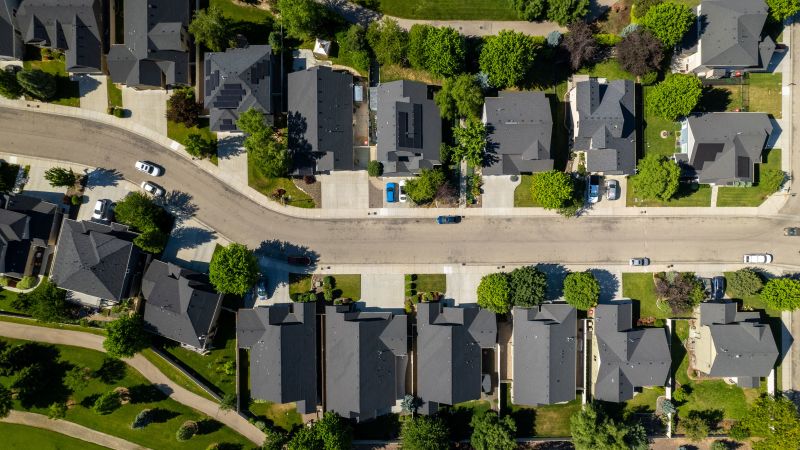Elevated mortgage rates and higher home prices have made owning a home feel increasingly out of reach for many Americans.
Last month, the Federal Reserve cut its benchmark interest rate by half a percentage point and signaled that more cuts are coming.
But post-pandemic inflation has left scars on the housing market. Would-be buyers feel left behind, and even many of those who already own a home feel stuck, unable or unwilling to give up cheap mortgages to find new properties.
CNN spoke to Americans spanning from early career to retirement age about how the Fed’s rate cuts will impact their housing plans. Here’s what they had to say:
Robert Galvez, a 27-year-old manufacturing engineer in the semiconductor industry, said he was “sick and tired of renting” his apartment in New Hampshire, and he now plans to buy his own place next year.
“When you take out a mortgage, you’re building wealth. When you’re renting, that money is going to someone else,” he said.
In the years after the pandemic, home prices have climbed to near-record highs. According to the National Association of Realtors, the median existing-home sales price was $416,700 in August, the 14th consecutive month of year-over-year price increases.
Galvez wants to buy a one- or two-bedroom condo before his lease ends in June, but his biggest concern is finding a place he can afford. He hopes interest rate cuts will increase his buying power.
“I’m hopeful mortgage rates will lower even more by spring,” Galvez said, though he expressed concern that lower rates could create increased competition in the market from other interested home buyers and corporations.
Galvez plans to look into a Federal Housing Administration mortgage, which is government backed and requires a smaller downpayment. He also said that Vice President Kamala Harris’ presidential campaign promise of $25,000 in down payment support for first-time homebuyers appealed to him.
“Something like $25,000 in down payment assistance would definitely be helpful depending on how it works out,” he said.
Tony, who has been retired from his job in the electronic medical records industry since 2015, asked that he only be identified by his first name to protect his privacy.
At 73 years old, Tony said he and his wife recently began to consider moving to a smaller home that might be easier to maintain. But with elevated home prices and mortgage rates, moving to a smaller place, such as a townhome or condo, would cost more than their current $848 monthly mortgage payment.
Mortgage rates have steadily fallen in anticipation of further interest rate cuts from the Fed, with the average 30-year fixed mortgage rate dropping to 6.12% in the week ended October 3, according to Freddie Mac.
While that’s a significant decrease from last fall’s peak of 7.79%, it’s still higher than average mortgage rates in the nearly 14 years between 2008 and 2022.
“Even a decent interest rate today far exceeds what we’ve been planning and budgeting on since we bought this home,” said Tony, who said his interest rate was 3.75%.
Tony said he would more seriously consider moving if mortgage rates drop back down to 4%. Instead, he and his wife will likely stay in their home until they can no longer take care of it.
“That’s the scary thing for us,” he said. “What am I going to do when I really am elderly and incapable of caring for myself?”
While homeownership is the goal for many Americans, others may be more content to hang on to the flexibility of renting.
Safiya Reid, who manages employee engagement at an insurance carrier, closed on a new home in the Atlanta area with her husband in February, but she said she wishes that she had waited for the Fed’s interest rate cuts.

“I’m constantly reading every single article that comes out about the looming rate cuts and what’s going on with real estate commissions,” she said, referring to August rule changes by the National Association of Realtors that some experts expect will lower real estate commissions. “With all these factors it’s like, oh man, it looks like we actually picked the worst time to buy a house.”
Reid said she still feels the sting of a bad homeownership experience she had at 22, when she purchased her first home straight out of college in 2008 just before the housing market crash. After selling that home in 2017 for a $4,000 profit, Reid said she and her husband were happy to be renters for a few years.
But late last year, they decided to buy a home big enough for family to come over and stay. They secured their mortgage through NACA, a government-approved nonprofit housing counseling organization. Reid said they were able to buy down their loan to 4.875%, meaning that they paid more money at closing to obtain a lower interest rate on their mortgage, but Reid said she still feels uncomfortable with the monthly payments.
Reid said that even if rates drop lower, she’s been advised that it’s difficult to refinance a NACA mortgage rate.
“I just feel uncertain about whether I made the right decision. For me, I’m dealing with a bit of trauma from the last house I owned,” she said. “You just don’t want to be in a situation where you feel like even with all the due diligence and all of the research, we still ended up making a poor financial decision.”
Read the full article here


